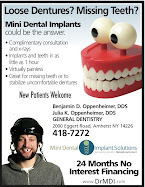You might be surprised to know that about 30 million Americas are missing all their teeth in one or both jaws. In addition, according to the American Academy of Implant Dentistry (AAID) two in three Americans have missing teeth. The AARP says there is an “Over 50 Dental Crisis,” noting dental disease has become a silent epidemic among older Americans.
The greatest concern is that older adults with missing teeth often have lost them to periodontal disease. This disease of the gums and bone can result in bacteria and infection migrating through the bloodstream to vital organs. Adults with missing teeth are also unable to eat properly resulting in nutritional deficiencies.
Aside from dental and nutritional problems, missing teeth have a negative influence on self-confidence and social activities. Many family and social functions revolve around meals, and these situations can be difficult, if not embarrassing, for anyone who can’t chew properly. Also, when teeth are lost, the supporting jaw bone decreases as well causing shifting of adjacent teeth and negative changes to the bite.
Some adults with missing teeth rely on bridgework or dentures, but these require grinding down healthy teeth to anchor each side of the bridge. Bridges also tend to fail after only 5-10 years due to tooth decay or heavy bite forces that loosen the anchor teeth. As a result teeth supporting the old bridge are often lost, requiring insertion of longer bridges that further compromise the situation. Finally, removable dentures are bulky, uncomfortable and can result in speaking and eating difficulties.
It is no surprise that the AAID recommends dental implants as a better alternative to missing teeth. They preserve the jaw bone, do not decay, and function like natural teeth. Over the years there have been many innovations in implant dentistry, including 3D imaging, and the development of economical alternatives. One of these is mini implants. They are narrow, about the size of a toothpick, and can be used to stabilize a lower denture. In most cases, four mini implants are inserted in the front of the jaw using mild anesthesia. The denture is then carefully adjusted to allow it to snap onto the mini implants. If successful, the mini implants will firmly secure the lower denture and prevent slippage. Typically patients can eat lightly about an hour after the procedure.
Today, implant dentists apply the principles of evidence-based dentistry in their practices. Evidence-based research holds great promise for developing streamlined dentistry that will make implants more affordable for greater numbers of prospective patients.
About the Author:
Dr. Benjamin Oppenheimer is a leader in the field of Mini Dental Implants, and has taught hundreds of dentists how to use them. A frequent lecturer and author, he has helped hundreds of patients locally and nationally. Call 716-418-7272 for a free x-ray and Mini Dental Implant exam. Learn more at www.DrMDI.com.
About Benjamin D. Oppenheimer, DDS, FICOI

- Dr. Benjamin D. Oppenheimer
- Amherst, NY, United States
- Dr. Benjamin D. Oppenheimer is a graduate of the University at Buffalo School of Dental Medicine. There he received a Dean's letter for Academic Excellence as well as the International Congress of Oral Implantologists award. He is now one of the leading experts in the world on Mini Dental Implants and a fellow of the ICOI. He has taught hundreds of dentists to use minis and has served as a consultant to the IMTEC Corporation, the manufacturer of the MDI product as well as Dental tech laboratories, Evolution Dental, Global Dental Sciences. He currently is a Key opinion leader to 3M ESPE Dental Implants. He is also the author of a number of scientific journal articles on the subjects of dental implants, bone grafting, mini dental implants and Cone Beam CT for dentistry. As well as offering dental implants, Dr. Ben provides all aspects of patient care for adults and children in Amherst, NY a suburb of Buffalo NY. He focuses on dental implant treatment in his buffalo office. Dr. Oppenheimer has also served as a business consultant for Jenius Industries Inc. and VBS Holdings LLC. He currently is a Member of Apex dental solutions, LLC, a mini implant marketing agency.





